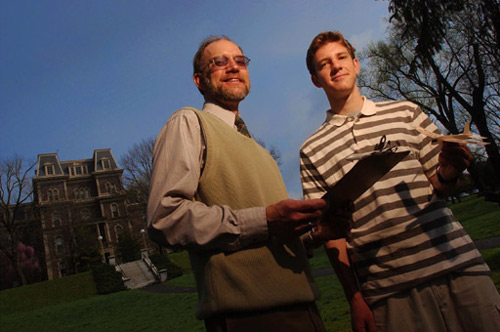Long fascinated by how the airline industry routes connecting flights, economics and business major Michael Levey ’02 (Pine Brook, N.J.) is studying its “hub and spoke” system for his honors thesis.
The hub is the large, popular city and the spokes are the smaller cities around it.
“My topic is an econometric model for predicting the future locations of U.S. airline hubs,” explains Levey. “Since deregulation, the hub and spoke system has been critical in that airlines have increased load factors, reduced average costs, and offered more nonstop flights from a given city to more points than would be possible without a hub.”
“The decision to make a city a hub is not something that can be done overnight,” continues Levey. “It is a decision that affects numerous factors that I plan to study such as the population or weather patterns of a city, which in the end could better satisfy the passenger, thus increasing profits and making airlines more competitive in the future.”
Levey lives near Newark, N.J., which Continental Airlines recently chose to be its hub. “Since this decision, Continental has been turning significant profits for the airline industry,” he says. “This is an opportunity to research what factors are involved in airlines’ choosing a city to be a hub.”
Although the events of Sept. 11 have had a significant negative impact on the airline industry, Levey says his model will work regardless of the state of the industry.
“While the most recent terrorist attacks on the U.S. have drastically lowered passenger demand, I feel that in the long run, passengers will once again choose to fly when they are confident that airports are safe,” says Levey. “As a result, learning where to create and expand hubs now will become even more important to success in the future.”
There has not been much research on the location of airline hubs, making this a great opportunity for Levey to make his mark, he says. “Doing research is basically a never ending cycle of constantly bettering society in the future by taking past research and building on it,” says Levey. “And I chose to be a part of this cycle.”
In doing research for his thesis, Levey has relied heavily upon the expertise of the staff at Skillman Library. “The library staff is unbelievable with the help they can provide in finding rare data or getting practically any document out there through interlibrary request,” says Levey. “The librarians are phenomenal.”
“This year the librarians sent out letters to all honors students, giving them the opportunity to meet individually with reference librarians so we could talk about their research needs and guide them,” says Terese Heidenwolf, head of information and instructional services. “Michael was the first one to take advantage of this service. I’ve met with him probably ten times or even more, helping him get the data he needs from reference books and government web sites.”
“It’s a big project to gather all this information and some people don’t always understand what a time consuming process it can be,” continues Heidenwolf. “Michael’s learned that and fortunately he started early enough to get all the data he needs. He’s enthusiastic and eager and will learn a lot through this project.”
Levey is also relying on the expertise of his thesis advisor, Thomas Bruggink, associate professor of economics and business.
“Mike is looking at many, many variables for his location model because he wants to distinguish it from the two earlier studies on this issue,” says Bruggink. “He is also very thorough. When he estimates the model using his sample, many of these variables will not make it to the final version. I envision around 10 variables at most, but this is only a guess. He came up with several variables as an extension of variables from the literature review, and some he came up with on his own. Mike tries very hard and wants all his work to be perfect.”
Levey is glad to be working with Bruggink.
“He is clearly qualified, as shown by his published work and success in his past students’ theses,” says Levey. “At the same time, he is a confident and determined person, which are important qualities that I look for.”
Last summer, Levey studied abroad in Mexico. He took classes for six weeks while staying with a Spanish family. Levey is on the dean’s list, captain of the men’s varsity tennis team, and a member of Chi Phi fraternity, Omicron Delta Epsilon (international honor society for economics), and the Investment Club.

A National Leader in Undergraduate Research. Michael Levey made a presentation on honors research he did under the guidance of Thomas Bruggink, professor of economics and business, at the National Conference on Undergraduate Research.
